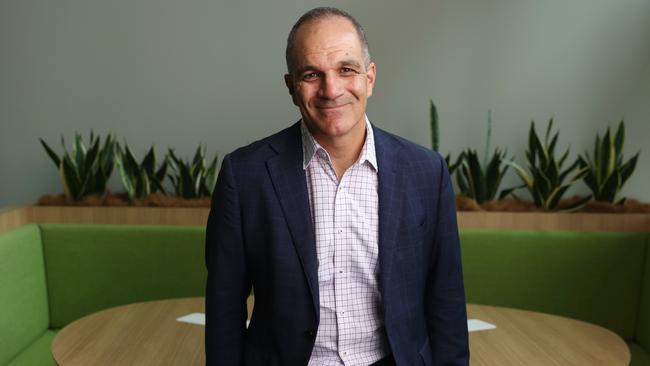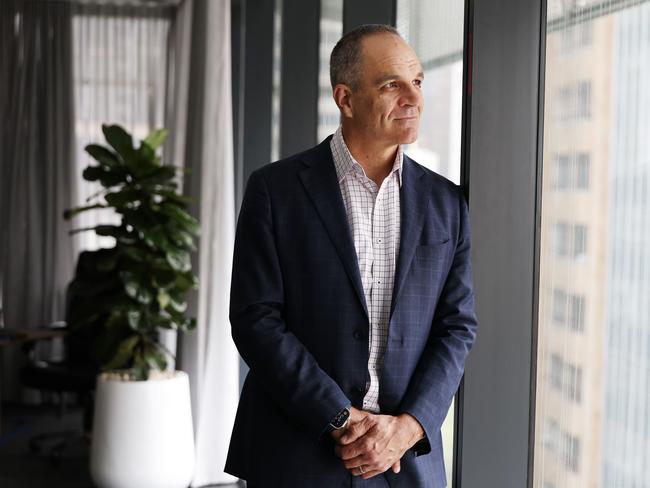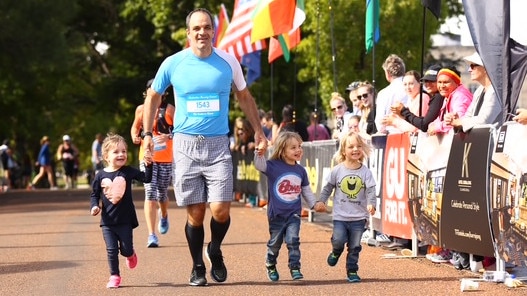New to management? You’ve probably got low job satisfaction
Juggling a corporate job, a personal life, and 13-year-old triplets is not for the faint of heart. But Dan Hunter would not have it any other way.

Juggling a corporate job, a personal life, and 13-year-old triplets is not for the faint of heart. But Dan Hunter would not have it any other way. This week, with his wife away for work and school returning, the chief executive of Business NSW had a highly organised plan to ensure things ran smoothly.
“So, making sure I know what the day ahead looks like the night before, that includes kids and includes work – I had a seven o’clock start this morning, so I made sure all the kids’ bags were packed, and that they have their lunches organised, and that they know what to do,” Mr Hunter said.
It’s those little but highly organised steps, combined with good sleep hygiene and waking up extra early to exercise, that add up and help him to cope with the stresses of work and life. Combined, he said they were the steps that allowed him to be a present father, husband, and boss.

“I don’t always get it right, but I am fairly disciplined about my work-life balance,” he said.
“You know, I think as a leader, you have a lot of organisational research resources at your disposal, and you don’t need to do everything yourself – although the demands of jobs at certain times don’t allow for that. But I think it’s about being disciplined and well planned and making sure you’ve got quality time for yourself and quality time with your kids as well.”
Business NSW, which Mr Hunter leads, has an annual turnover of $250m and about 700 employees. He’s previously headed up larger organisations and worked in government roles. That background provided him with a good understanding of workplace stress and the connection between wellbeing and a positive workplace.
“People notice if you’re not upbeat, if you’re not communicating, if you’re down, if you’re happy, if you’re sad, if you’re angry … and it plays through the organisation,” Mr Hunter said.
“Organisations with a really good culture are very successful over time. You simply can’t deliver a successful organisation without a good organisational culture. Things go up and down and it takes a long time, but that’s the ultimate impact of a poor organisational culture: a poor organisational result.”

It’s a sentiment backed by workplace culture and leadership consultant group Human Synergistics which is releasing the results of its Nation’s Wellbeing Report that examines the stress and wellbeing of 70,000 workers across Australia and New Zealand. It found that junior, or frontline, managers rate their ability to handle stress the worst of any other level of leadership. They also have poor job satisfaction, only 44 per cent feeling supported by their organisation to do well.
Corinne Canter, the head of consulting at Human Synergistics, said the results showed the first step into leadership was often the hardest and could take a personal toll.
“People are often promoted into manager roles because of their task effectiveness, but leadership requires a different skill set,” Ms Canter said.
“Many frontline leaders are left to figure it out on their own. They’re under a lot of strain … they don’t just lead; they’re a captain and they’re a coach. If people are away, they’re the ones to fill in. They’re always hands-on and their ability to manage stress at the frontline leader level is lower than it is at the higher levels.”

That level of management is also the one that interacts the most with other staff and can therefore set the tone of an entire organisation. Workplaces with a bad culture can affect both employee wellbeing and a company’s bottom line by leading to a rise in things like absenteeism. The Productivity Commission previously estimated the cost of absenteeism and presenteeism – also known as “quiet quitting” – to be about $17bn a year.
“What we’ll see is motivation and satisfaction might be low, but (the employee has) indicated that they’re going to stay with the organisation,” Ms Canter said.
“People who are not motivated or stressed, they’re normally part of a team. If people are absent, then it means that somebody else has got to pick up the load, and so I think we then get into a kind of an unhelpful cycle that creates stress and kind of traps stress.
“When we were looking at this, and we looked at the cost of workplace stress, it roughly amounts to 3.2 days per worker lost through stress and absenteeism and presenteeism.”
The report is based on five years worth of data, collected by Human Synergistics’ Life Styles Inventory, which uses self-assessment and colleague feedback. Together, they help to build a picture of the thinking and behaviours of 70,000 workers.
The report found senior leaders were also struggling with their wellbeing – 38 per cent of chief executives surveyed say they don’t manage stress well; 16 per cent say they are “very tense” and under stress; while 56 per cent are reporting they have high levels of support from their organisation to do well.
“What we’re seeing is some tension points between levels of satisfaction with the role and creating impact, being able to influence and make a difference. Yet, it comes at a cost, a personal cost, in terms of health indicators managing stress; 16 per cent said that they were under intense pressure,” Ms Canter said.

She said the findings highlighted the need for increased investment and development of all levels of leadership and for those in the highest positions of management to be more supportive of those coming through the ranks.
It’s something Mr Hunter tries to provide in his workplace, saying he works in an open plan office because he wants to indicate that he is approachable and human.
He said there were undeniable consequences of workplace unhappiness and stress.
“Stress can impact on all aspects of your life, from work to home,” he said.
“There’s much more of a blurred line now that people are working from home … I think that’s a good thing, because it gives us flexibility, but there’s a darker side to it as well, and it’s hard to unplug from your work, and therefore you can carry the stress around with you in all aspects of your life, if you’re not careful.”
The report concluded that for people to be at their best, they need enough time to recover and recharge their batteries. However, when people are stressed, the first things to be dropped are healthy habits like health, fitness and time to themselves, prompted Human Synergistics to encourage workplace leaders to put greater attention to improving personal wellbeing.





To join the conversation, please log in. Don't have an account? Register
Join the conversation, you are commenting as Logout